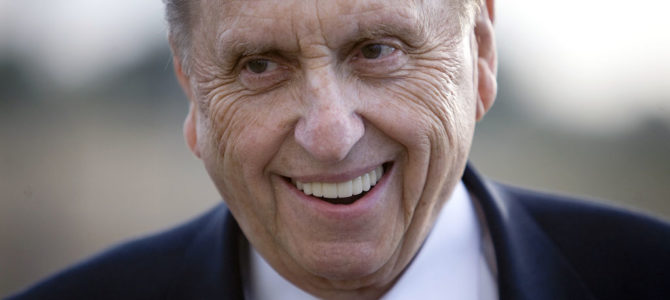Earlier this week, the president of the Mormon Church (a.k.a. the Church of Jesus Christ of Latter-day Saints) died at 90 years old. Thomas Monson was considered a prophet by members of his flock and revered by many in the church, which is arguably the largest and most influential religion founded in the United States.
One journalist told me how the media, in particular The New York Times, reacted to his death is “why nobody trusts media anymore.” This is how The New York Times chose to describe a man who committed his life to charity and service to his church:
Thomas Monson, the president of the Mormon church who rebuffed demands to ordain women as priests and refused to alter church opposition to same-sex marriage, died Tuesday at 90 https://t.co/NKEHpAXzb1
— The New York Times (@nytimes) January 3, 2018
That tweet was how the Times began its obituary, which led some Twitter users to draw some comparisons about how the paper treated other deceased leaders:
A tale of two obituaries. pic.twitter.com/vwLPjLWOoJ
— Noam Blum (@neontaster) January 3, 2018
There is, of course, far more nuance and depth possible while analyzing Monson’s tenure as Mormon Church president. One popular Mormon blog, By Common Consent, wrote after his death:
Above all, I think he’ll be remembered for caring about people, and he implemented that compassion and Christ-like charity as the fourth mission of the church: Care for the poor and needy.
He was a beloved leader who was in the Mormon spotlight almost all his adult life.
But gosh, the 10 years of his presidency were difficult. I’ll probably look back on this era not as one of increased compassion and charity, but as a divisive period when so many friends and loved ones left the church. I don’t know if that’s fair to President Monson. The world changed so fast during his tenure, and I may never know which church actions and policies should be attributed to him. There isn’t a lot of information about his deteriorating mental faculties, the mechanics of how specific decisions were made, or his views on crucial issues.
Faithful members of the church were understandably upset and angry that The New York Times memorialized Monson less charitably than it did Fidel Castro, Hugh Hefner, and even Charles Manson. And why is that? One Twitter user remarked,
A reminder that servants of The Lord, including The Lord himself, have never been, and never will be popular, liked, or even respected by the world. Evil exists, but most importantly, so does God and this man was his prophet.
— ArizonaUte (@Harris04Austin) January 3, 2018
Across the rest of the media, Monson’s death was treated as a blurb, barely worthy of mention. The story appeared 14 minutes into NBC’s “Nightly News,” with Lester Holt taking 23 seconds of the broadcast to explain the life, work, and importance of the Mormon leader. The CBS “Morning” show devoted two more seconds to the story than NBC did. CNN ran a short blurb, which to their credit also included positive details about his ministry,
On his 81st birthday, Monson was asked what would be an ideal gift from church members. He replied: “Do something for someone else on that day to make his or her life better. Find someone who is having a hard time, or is ill, or lonely, and do something for them. That’s all I would ask.”
The collective shrug from the majority of the media (with a few exceptions, like this from NPR), in addition to the dig from the Times, is precisely how it has earned scorn from faithful Americans. Even Mormons, who have a deserved reputation as the nicest group of Americans, were upset with the Times’ treatment of their beloved leader. The Mormon Light reported “Hundreds of reactions in support of President Monson have flooded in from those who felt this great man deserved a much better send-off.”
With the selection of a new leader, the Mormon Church is facing tough questions about its future in an increasingly secularizing and liberalizing country. Where might its stance on baptism of gay children or women priests go in the next decade? An honest and fair look at the future of the church would be an interesting read; but that’s not what the Times set out to write. As The Atlantic’s McKay Coppins pointed out on Twitter,
https://twitter.com/mckaycoppins/status/948795320112205824
The Times obituary wasn’t a look forward to what may be in store for the Mormon Church, but instead taken as an opportunity to demonize a leader who has spent his life and influence trying to better the world through charity and the word of God.
That fact is what the Times apparently finds most troubling and worthy of their contempt, so much so that they took the opportunity of Monson’s obituary to smear not just the Mormon president and prophet, but also all Americans of faith. For that reason, the Times should be held to account not just by the millions of Mormons in America, but other religious Americans as well.









